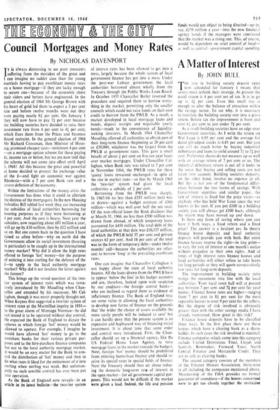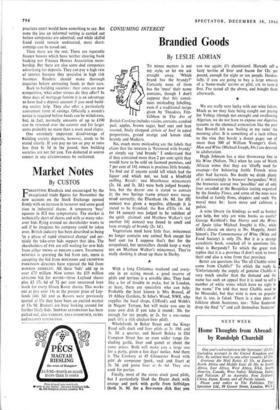A Matter of Interest
By JOHN BULL
MHE rise in building society deposit rates I now scheduled for January 1 means that savers must rethink their strategy. At present the usual return is 4 per cent net of tax. It is to go up to 41 per cent. Even this small rise is enough to alter the balance of attraction within the savings sector. To see why, it is necessary to translate the building society rate into a gross return. Before tax the improvement is from just over 61 per cent to just under 71 per cent.
As a result building societies have an edge over Government securities. As I write the return on War Loan is 6.95 per cent and the average for dated gilt-edged stocks is 6.85 per cent. But you can still do much better by buying industrial debentures and loans to yield around 71 to 71 per cent. Preference shares do not measure up so well with an average return of 7 per cent or so. The industrial debenture return is not all it looks in the sense that buying and selling costs are not taken into account. Building societies deposits, on the other hand, involve no expense at all. But this is not one of the fundamental differ- ences between the two forms of savings. With Government securities and similar paper, the rate of interest is fixed but the price varies—as anybody who has held War Loan since the war knows to his cost. If you put £100 in a building society you will always get £100 back, although the return may have moved up and down.
Is there any form of saving where you can have it both ways, a fixed return and a fixed price? The answer is a hesitant yes. In theory finance house deposits and local authority deposits will provide you with both. But some finance houses reserve the right—in tiny print— to vary the rate of interest at one month's notice without prejudice to their own rights. And at times of high interest rates finance houses and local authorities will either refuse to take loans for long periods or they will quote comparatively low rates for long-term deposits.
The improvement in building society rates brings the movement into line with the local authorities. Your local town hall will at present pay between 7 per cent and 71 per cent for your money. Finance house rates are higher—ranging from 7 per cent to 81 per cent for the most reputable houses to over 9 per cent for the others. But the degree of risk involved is obviously greater than with the other savings media I have already mentioned. How great is this risk?
Finance house deposits have to be classified three ways. In the first place there are those houses which have a clearing bank as a share- holder. In such cases the risk involved is minimal. Finance companies which come into this category include United Dominions Trust, Lloyds and Scottish, Bowmaker, Forward Trust, North Central Finance and Mercantile Credit. They are as safe as clearing banks.
The second category consists of the members of the Finance Houses Association, thirty-nine in all including the companies mentioned above. Membership of the FHA provides no formal guarantee of soundness—if the houses concerned were to get too closely together the restrictive
practices court would have something to say. But none the less an informal vetting is carried out before companies are admitted; and while skilful fraud could remain undetected, most short- comings can be nosed out.
Then there are the rest. There are reputable finance houses which have neither clearing bank backing nor Finance Houses Association mem- bership. But there are also some dud companies advertising for deposits. They can pay a high rate of interest because they specialise in high risk business. Readers should make thorough inquiries before entrusting funds to their care.
Back to building societies: their rates are now competitive, what other virtues do they offer? In these days of mortgage famine it is an advantage to have had a deposit account if you need build- ing society help. They also offer a particularly convenient form of savings. Officially a month's notice is required before funds can be withdrawn, but, in fact, normally amounts of up to £100 can be returned over the counter and for larger sums probably no more than a week need elapse.
One extremely important disadvantage of building society deposits, however, needs to be stated clearly. If you pay no tax or pay at rates less than 8s 3d in the pound, then building societies are not for you. Tax deducted at source cannot in any circumstances be reclaimed.































 Previous page
Previous page